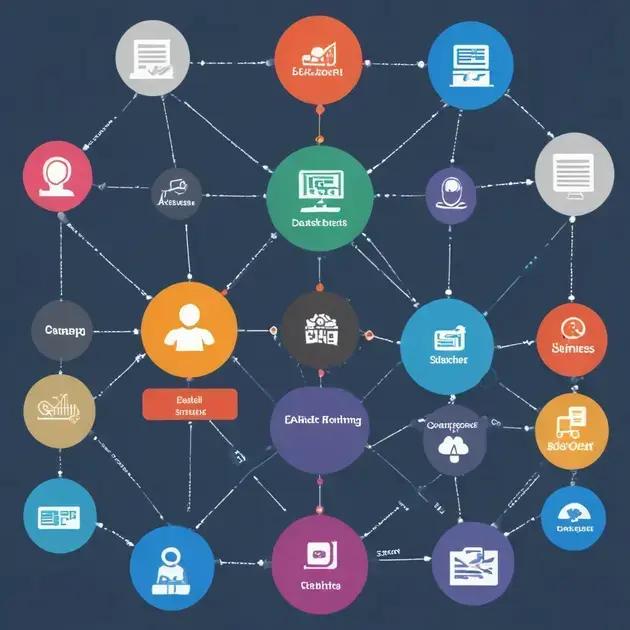Client database software for small businesses helps manage client information, enhance relationships, and streamline operations. By centralizing data, automating tasks, and providing analytical insights, this software empowers small businesses to boost sales and improve customer service effectively.
Client database software for small business is a game-changer for entrepreneurs looking to optimize their operations and improve customer relationships. These tools allow you to manage client information efficiently, enabling personalized communications and effective marketing strategies. In this article, we’ll delve into what client database software is, highlight its benefits, guide you in choosing the right option, discuss integrations with other tools, and showcase inspiring case studies of small businesses thriving with these solutions.
What is Client Database Software?
Client database software is a specialized tool designed to help small businesses manage and organize their client information effectively. By utilizing this software, businesses can store data on clients, track interactions, and analyze trends that inform their marketing strategies.
Key Features of Client Database Software
Some essential features of client database software include:
- Contact Management: Keep all client details in one place, making it easy to access important information when needed.
- Communication Tracking: Record interactions such as emails, calls, and meetings, which helps maintain a clear history of client relationships.
- Data Analysis: Analyze client data to identify purchasing patterns, preferences, and trends that can help tailor marketing efforts.
- Task Management: Set reminders and tasks related to client follow-ups and appointments, ensuring timely and organized communication.
Why Small Businesses Need Client Database Software
For small businesses, the ability to efficiently manage client data can lead to better customer service and improved sales. Without a structured approach, small businesses may struggle with inconsistent communication and missed opportunities. Client database software provides a systematic way to handle client relationships, fostering loyalty and growth.
Ultimately, having a reliable client database is crucial for small businesses looking to enhance their operational efficiency and create lasting relationships with their customers.
Benefits of Using Client Database Software for Small Businesses

Using client database software can offer a wide range of benefits to small businesses, helping them streamline operations and improve customer relations. Here are some key advantages:
Enhanced Organization
Client database software consolidates all client information into one easily accessible location. This organization reduces the time spent searching for contact information or previous interactions, making everyday tasks more efficient.
Improved Customer Service
With easy access to client data, businesses can provide personalized service and respond quickly to customer inquiries. Knowing a client’s history and preferences allows for tailored interactions, which can enhance satisfaction and build loyalty.
Increased Sales Opportunities
By analyzing client data through the software, small businesses can identify sales trends and opportunities. This information helps in crafting targeted marketing campaigns that resonate with potential customers and maximize conversion rates.
Automated Tasks
Client database software can automate many routine tasks, such as sending follow-up emails or reminders. This automation frees up time for employees to focus on more strategic initiatives that drive growth.
Data Security and Privacy
Managing client data through specialized software can enhance data security. Businesses can implement security measures to protect sensitive information, ensuring compliance with data privacy regulations and building trust with clients.
How to Choose the Right Client Database Software?
Selecting the right client database software can make a significant difference in your small business operations. Here are some key steps to follow when making your choice:
Identify Your Business Needs
Before choosing a software, assess what features are most important for your business. Consider what kinds of client data you need to manage and how you plan to use that information for better service.
Evaluate Software Options
Research different client database software options available in the market. Look for products that specifically mention features like contact management, automation, and data analysis capabilities. Reading reviews and testimonials from other small business owners can provide valuable insights.
Consider Budget and Pricing
Cost is always a factor. Make sure to review the pricing structures of various solutions. Some software might have hidden fees for additional features, while others may offer free trials or tiered pricing models that scale with your business growth.
Check Integration Capabilities
Ensure that the client database software can easily integrate with other tools you already use, such as email marketing platforms or accounting software. This integration helps streamline your operations and maintain consistency across different functions.
Request a Demo
Once you narrow down your choices, request a demo or take advantage of free trials. A hands-on demonstration allows you to experience the user interface and features, ensuring they meet your operational needs.
Integrating Client Database Software with Other Tools

Integrating client database software with other business tools is essential for maximizing efficiency and ensuring smooth operations. Here are some important points to consider when integrating these systems:
Importance of Integration
Integration helps create a seamless flow of information between different applications, reducing manual data entry and minimizing errors. This allows for a more unified approach to managing client relationships and business operations.
Common Tools to Integrate
Several tools can be integrated with client database software, including:
- Accounting Software: Syncing client data with accounting tools helps maintain accurate financial records and invoicing.
- Email Marketing Platforms: Integrating email marketing tools allows businesses to use client data for targeted campaigns and track engagement.
- Customer Support Systems: By connecting support tools, businesses can provide better service by accessing client history during interactions.
Steps for Successful Integration
To effectively integrate client database software with other tools, follow these steps:
- Evaluate Compatibility: Ensure that the software tools you choose are compatible and can share data seamlessly.
- Map Data Flow: Plan how data will flow between systems, identifying which fields need to synchronize.
- Test the Integration: After setting up, conduct tests to ensure that data transfers correctly and reliably.
Training Staff
Once integration is complete, provide training for employees on how to use the integrated systems effectively. Familiarizing staff with the new processes will ensure smoother operations and quicker adaptation to changes.
Case Studies of Small Businesses Thriving with Client Database Software
Many small businesses have successfully leveraged client database software to enhance their operations, improve customer relationships, and boost sales. Here are a few inspiring case studies:
Case Study 1: Local Boutique
A small clothing boutique implemented a client database to manage customer information and track purchases. By using the software, they were able to analyze buying patterns and identify popular items. As a result, the boutique launched targeted marketing campaigns that increased sales by 30% within three months.
Case Study 2: Landscaping Service
A landscaping company adopted client database software to maintain detailed records of client preferences and project history. This system allowed them to provide personalized service, which led to an increase in customer loyalty. The business reported a 40% rise in repeat customers after integrating the software into their operations.
Case Study 3: Digital Marketing Agency
A digital marketing agency utilized client database software to manage leads and client projects. The software’s analytics features enabled the team to assess campaign performance effectively. With these insights, they optimized their marketing strategies, improving client satisfaction and resulting in a 50% growth in their client base over a year.
Key Takeaways
These case studies highlight the transformative power of client database software for small businesses. By organizing client data, tracking interactions, and analyzing trends, these businesses were able to enhance their service offerings, foster loyalty, and drive growth. Embracing such technology can be a game changer for any small business.
In Conclusion, Why Client Database Software Matters
Client database software is essential for small businesses looking to improve efficiency and boost customer relationships. By using this software, businesses can organize client information, automate tasks, and analyze data to better understand their customers.
We’ve explored several case studies that highlight the positive impact of implementing client database software. From increased sales in retail to improved customer loyalty in services, the benefits are clear.
As small businesses continue to face competition, adopting technology like client database software is not just an option—it’s a necessity. Embrace this tool to drive growth, enhance service, and stay ahead in today’s market.
FAQ – Frequently Asked Questions About Client Database Software for Small Businesses
What is client database software?
Client database software is a tool that helps small businesses manage client information, track interactions, and analyze customer data.
How can client database software improve customer relationships?
By organizing client information and tracking previous interactions, businesses can provide personalized service and respond more quickly to customer inquiries.
What features should I look for in client database software?
Look for features like contact management, communication tracking, data analysis, and task automation to help streamline your operations.
How does integrating client database software benefit my business?
Integration allows for a seamless flow of information between different tools, reducing manual work and minimizing errors, leading to improved efficiency.
Can small businesses afford client database software?
Yes, many client database software options are budget-friendly and offer scalable solutions for small businesses.
What are some success stories of businesses using client database software?
Many small businesses have reported increased sales, improved customer loyalty, and enhanced efficiency after implementing client database software.




